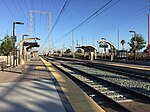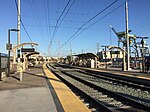Pacific Reserve Fleet, San Diego

Pacific Reserve Fleet, San Diego was a part of the United States Navy reserve fleets, also called a mothball fleet, was used to store the many surplus ships after World War II. The Pacific Reserve Fleet, San Diego was near the Naval Base San Diego in San Diego, California. Some ships in the fleet were reactivated for the Korean War and Vietnam War. The reserve fleet stored post World War I ships, some that were reactivated for World War II.The USS Galveston (CL-93), a Cleveland-class cruiser was the last ship to depart the Pacific Reserve Fleet, San Diego. At the closing, only the Galveston and 11 other ships were remaining at the fleet. At its peak, 223 ships were stored in the fleet. The 12 rusty ships in fleet were sold off for scrapping and a few used for United States Navy target ships. The Pacific Reserve Fleet, San Diego closed in June 1975.
Excerpt from the Wikipedia article Pacific Reserve Fleet, San Diego (License: CC BY-SA 3.0, Authors, Images).Pacific Reserve Fleet, San Diego
Pier 5, San Diego
Geographical coordinates (GPS) Address Nearby Places Show on map
Geographical coordinates (GPS)
| Latitude | Longitude |
|---|---|
| N 32.679109 ° | E -117.124986 ° |
Address
Pier 5
Pier 5
92136 San Diego
California, United States
Open on Google Maps








